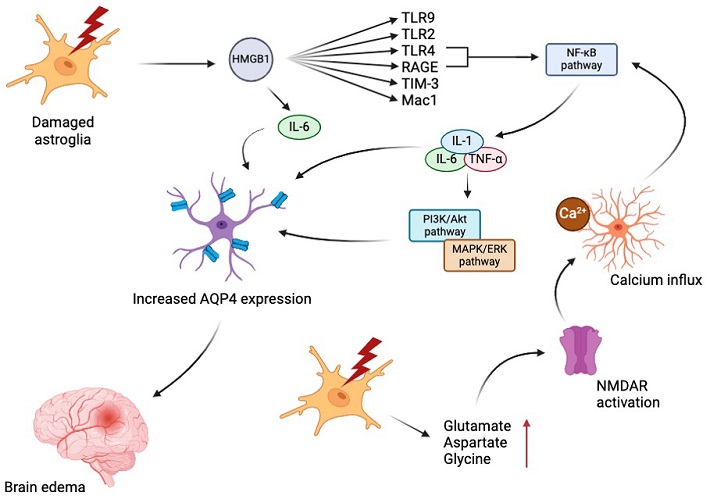Nikhil Prasad Fact checked by:Thailand Medical News Team Jun 17, 2024 1 year, 6 months, 1 week, 4 days, 21 hours, 55 minutes ago
Medical-News: Traumatic brain injury (TBI) is a serious health issue worldwide, affecting millions and leading to significant death and disability. A blow or jolt to the head can cause these injuries, which might result in changes in thinking, sensation, language, or emotions. TBI can have long-lasting physical and psychological effects, making it a major cause of prolonged hospital stays and disability. This
Medical News report features a study by researchers from Maria Sklodowska-Curie National Research Institute of Oncology-Poland and the Medical University of Lublin-Poland that explores the role of aquaporins in brain edema.
 Molecular mechanisms of AQP4’s dysregulation
The Challenge of Brain Swelling
Molecular mechanisms of AQP4’s dysregulation
The Challenge of Brain Swelling
One of the most critical secondary effects of TBI is cerebral edema, which is the swelling of the brain due to fluid buildup. This swelling increases pressure inside the skull, potentially causing further damage to brain structures. Managing this brain swelling is crucial to improve patient outcomes and reduce the risk of further injury.
What Are Aquaporins?
Aquaporins (AQPs) are proteins that form channels in cell membranes, allowing water and other small molecules to move in and out of cells. In the brain, AQPs, particularly AQP4, are vital for maintaining water balance. These proteins are mostly found in astrocytes, star-shaped cells that support nerve cells and help form the blood-brain barrier (BBB).
How AQPs Influence Brain Swelling
After a TBI, the brain's fluid dynamics are disrupted, leading to swelling. AQP4 plays a significant role in this process by controlling the movement of water in the brain. When the brain is injured, AQP4 channels can either help remove excess water, reducing swelling, or contribute to swelling if they malfunction.
Different Types of Brain Swelling
Brain swelling can be categorized into three types: cytotoxic, ionic, and vasogenic edema.
-Cytotoxic Edema: This type occurs when cells in the brain swell due to a lack of oxygen. The cells absorb too much water, causing them to swell.
-Ionic Edema: This occurs alongside cytotoxic edema and involves water and sodium ions entering the brain, usually before the blood-brain barrier (BBB) is compromised.
-Vasogenic Edema: This type happens when the BBB breaks down, allowing fluids and proteins from the blood to leak into the brain.
Role of AQP4 in Edema
AQP4 is the most abundant aquaporin in the brain and is closely linked to both cytotoxic and vasogenic edema. It helps regulate water flow in response to changes in the brain's ionic environment following injury. In cytotoxic edema, AQP4 channels allow water to enter the brain's central nervous system, while in vasogenic edema, AQP4 helps remove excess water through various pathways, i
ncluding direct removal to the bloodstream or through the cerebrospinal fluid (CSF).
Research and Future Directions
Research into AQPs is ongoing to understand their exact role in TBI and brain edema better. Studies have shown that manipulating AQP4 expression could potentially control brain swelling and improve patient outcomes. For example, reducing AQP4 levels in specific areas of the brain has been shown to decrease swelling and improve recovery in animal models.
Potential Therapies
Understanding the role of AQPs opens up new therapeutic possibilities. If we can develop treatments that target these water channels, we might control brain swelling more effectively. This could involve drugs that inhibit or enhance AQP4 function depending on the type and stage of edema.
Conclusion
Aquaporins, especially AQP4, are crucial in managing brain swelling after a traumatic brain injury. By regulating water flow in the brain, they can influence the development and resolution of cerebral edema. Continued research into AQPs could lead to new treatments that improve outcomes for patients with TBI, providing hope for better management of this challenging condition.
Key Takeaways
-Traumatic Brain Injury (TBI): A major health issue causing significant disability and death.
-Cerebral Edema: Brain swelling due to fluid buildup is a critical secondary effect of TBI.
-Aquaporins (AQPs): Proteins that regulate water movement in the brain, crucial for managing edema.
-AQP4: The most abundant aquaporin in the brain, plays a significant role in both cytotoxic and vasogenic edema.
-Future Therapies: Research into AQPs could lead to new treatments to control brain swelling and improve patient outcomes.
By understanding the role of aquaporins, particularly AQP4, in brain water regulation, we can develop better strategies to manage brain swelling and improve recovery after traumatic brain injuries. This knowledge not only advances scientific understanding but also holds promise for practical applications in medical treatment and patient care.
The study findings were published in the peer reviewed International Journal of Molecular Sciences.
https://www.mdpi.com/1422-0067/25/12/6553
For the latest on Brain Edema, keep on logging to Thailand
Medical News.
Read Also:
https://www.thailandmedical.news/news/breaking-university-of-alabama-discovers-that-mild-covid-19-causes-brain-temperature-elevation-and-free-water-increases-in-the-brain
https://www.thailandmedical.news/news/breaking-covid-19-news-study-finds-persistent-para-infectious-brain-injury-beyond-acute-phase-with-many-showing-upregulated-biomarkers-months-after
